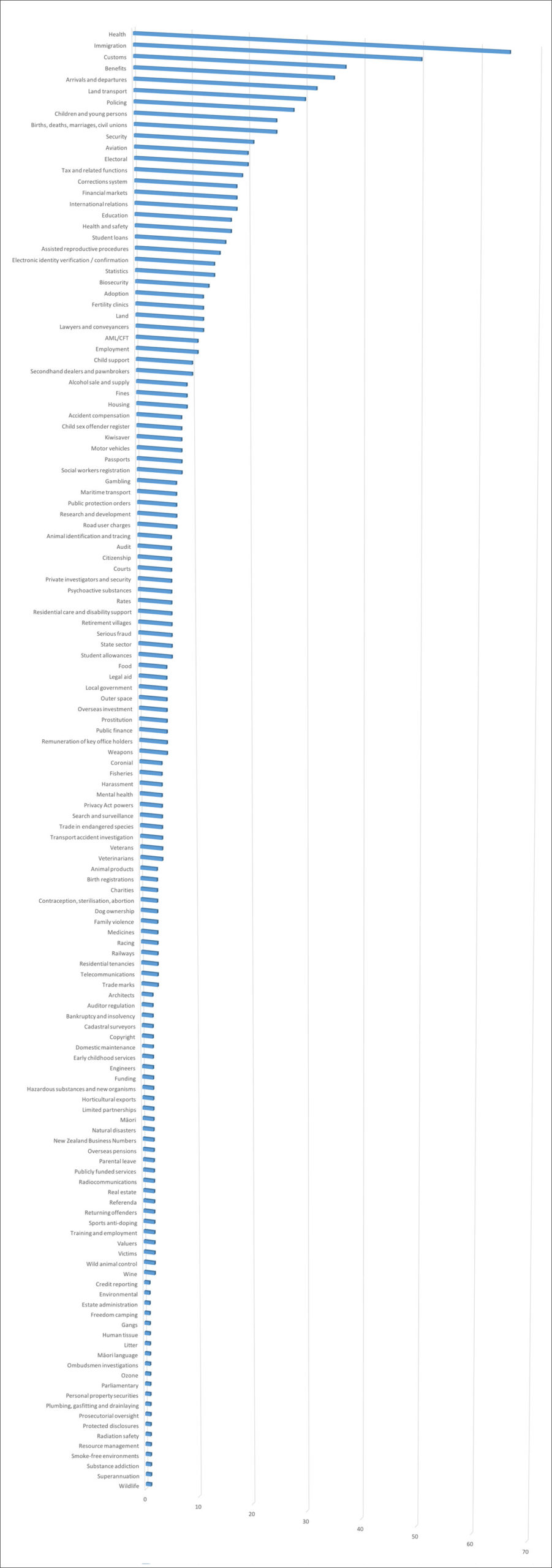Let’s look at subject-matter this time
In my last post, Which Government departments have the most information collection, use and sharing provisions?, I described which Government departments and non-Crown agencies feature the most in specific statutory provisions concerning (or that could cover) the collection, use or sharing of personal information.
If you’re interested in what a subject-matter ranking would show, you can see that below. This graph ranks the kinds of provisions mentioned above, but by subject-matter, rather than agency.

Some interpretative comments
When looking at this graph, you’ll probably notice a few things. It might help to explain a couple of them.
In the agency ranking, the Police were at the top of the list, but ‘Policing’ is not at the top of the list here. Why? That’s because the main subject matter of many of the provisions that name the Police (or constables) are not primarily concerned with ‘policing’ per se. Their primary focus is another main subject area. Constables feature in numerous provisions that actually relate to other subject areas. Customs is a good example. Children and young persons is another. Aviation is another. The provisions were still allocated to “Police” for agency categorisation purposes, but if “policing” was not the main purpose of the provision then the provision may not have been allocated to the “policing” category. I had to exercise discretion and judgement. I make these comments as we need to appreciate that different people could allocate the provisions in different ways and that could influence the rankings.
You may also notice that Health tops the subject matter rankings, whereas in the agency ranking the Ministry of Health ranked no. 6. This is due to the wide array of agencies involved in the health sector, the number of areas that can be grouped within the health category (‘Health’ is a bit like a superset category with a number of children), and the numerous provisions that exist across the health sector. For example, the relevant agencies include the Ministry of Health, District Health Boards, Pharmac, health practitioners, health profession authorities, the Health Promotion Agency, the Health and Disability Commissioner, the Health Quality and Safety Commission, the New Zealand Blood Service, and the Coroner, and the areas that coalesce into ‘Health’ include, for example, general health-related matters, mental health, substance addiction, radiation safety, psychoactive substances, prostitution (to the extent the provisions are health-related) and medicines (among others).
Scope
Note that the scope exclusions I mentioned in my previous post apply here too. I should also mention that the subject-matter taxonomy I generated when reviewing the statutory provisions was a combination of:
- subject matter I expected to find (and to that extent, I could develop part of the taxonomy in advance of the review); and
- subject matter I wasn’t expecting to find or simply didn’t contemplate.
This combination meant that a substantial part of the taxonomy grew organically as I progressed through the legislation. A potential consequence of that is that allocation of provisions to the different subject areas isn’t wholly scientific and pre-planned. On several occasions I had to exercise judgement as to which category or categories to allocate a given provision.
All that said, the graph does depict what, I imagine, many would predict as the top-ranking subject areas.
As you can see, the top 20 are:
- Health
- Immigration
- Customs
- Benefits
- Arrivals and departures
- Land transport
- Policing
- Births, deaths, marriages, civil unions
- Children and young persons
- Security
- Electoral
- Aviation
- Tax and related functions
- International relations
- Financial markets
- Corrections system
- Health and safety
- Education
- Student loans
- Assisted reproductive procedures (also allocated to Health)
As with the previous post, feel free to sign up to our mailing list if you’re interested in this sort of data (and the summaries of the provisions themselves).
